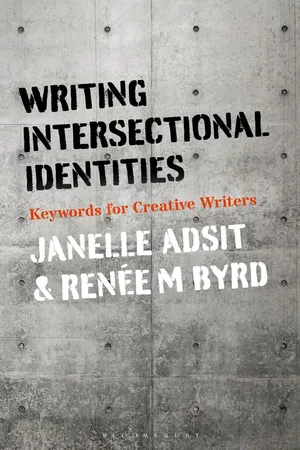
Writing Intersectional Identities
Keywords for Creative Writers
- 248 pages
- English
- ePUB (mobile friendly)
- Available on iOS & Android
About this book
Is it okay to write about people of other genders, races and identities? And how do I do this responsibly? Whether you are working in fiction, poetry, drama or creative non-fiction, becoming conscious of how you represent people of different social identities is one of the most important responsibilities you have as a writer. This is the first practical guide to thinking and writing reflectively about these issues. Organised in an easy-to-use A to Z format for practicing writers, teachers and students, Writing Intersectional Identities covers such key terms as: Appropriation
Authenticity
Body
Class
Counternarrative
Disability
Essentialism
Gender
Indigenous
Power
Privilege
Representation The book is meant for writers of fiction, poetry, screenplays and creative non-fiction who are seeking to develop a writing practice that is attentive to the world. The book is supported by a companion website at www.criticalcreativewriting.org.
Tools to learn more effectively

Saving Books

Keyword Search

Annotating Text

Listen to it instead
Information
Table of contents
- Cover
- Halftitle Page
- Title Page
- Contents
- Acknowledgments
- Introduction
- Appropriation
- Audience
- Authenticity
- Author
- Belonging
- Body
- Class
- Colonialism
- Community
- Consciousness
- Counternarrative
- Diaspora
- Disability
- Emotion
- Essentialism
- Gender
- Globalization
- Identity
- Indigenous
- Intersectionality
- Language
- Minoritized
- Multiculturalism
- National
- Positionality
- Power
- Privilege
- Race
- Religion
- Representation
- Sexuality
- Bibliography and Suggested Readings
- Index
- Imprint
Frequently asked questions
- Essential is ideal for learners and professionals who enjoy exploring a wide range of subjects. Access the Essential Library with 800,000+ trusted titles and best-sellers across business, personal growth, and the humanities. Includes unlimited reading time and Standard Read Aloud voice.
- Complete: Perfect for advanced learners and researchers needing full, unrestricted access. Unlock 1.4M+ books across hundreds of subjects, including academic and specialized titles. The Complete Plan also includes advanced features like Premium Read Aloud and Research Assistant.
Please note we cannot support devices running on iOS 13 and Android 7 or earlier. Learn more about using the app